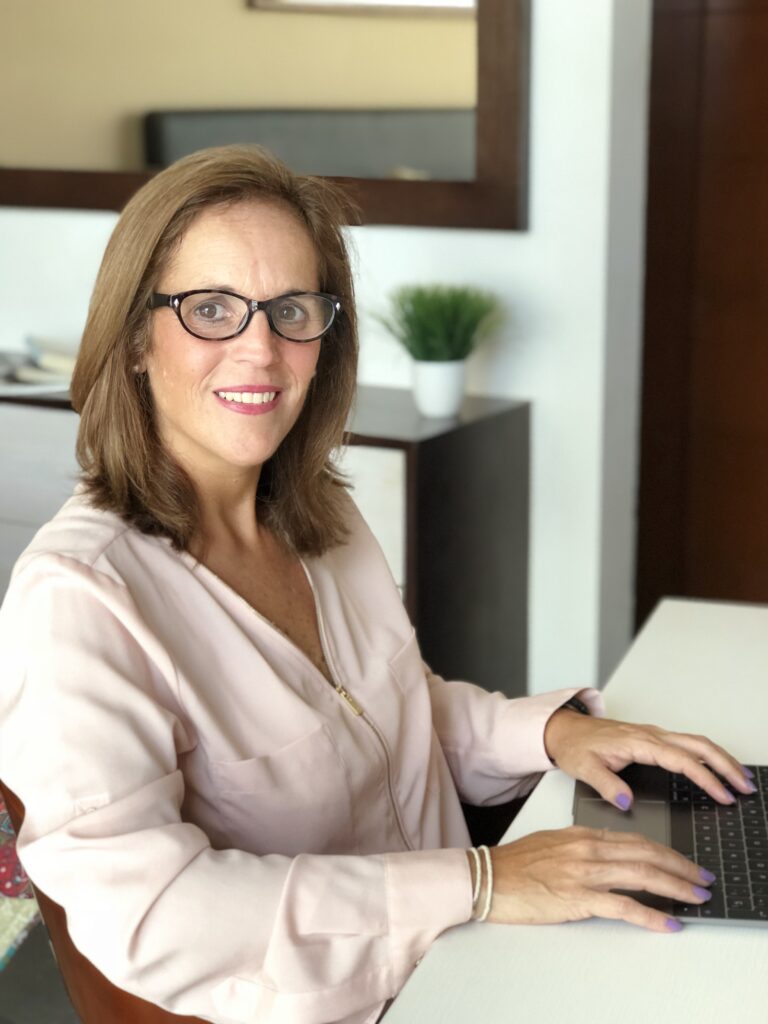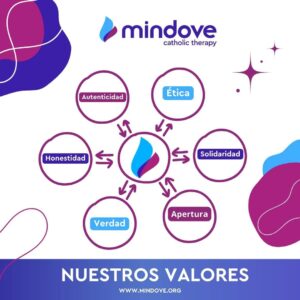“I experienced in my own life how psychological care and faith should go hand in hand”
Interview with Mercedes Vallenilla

The following is an interview with Mercedes Vallenilla, founder of Mindove: an innovative project that unites humanistic psychology and the Christian belief system.
Tell us a little bit about your story. Why did you promote Catholic Therapy?
Mercedes Vallenillas: The birth of Mindove and my relationship with Catholic Therapy is the fruit of my story. My life has been a path guided by God’s will. While I was a missionary in the Philippines with my husband many years ago, I was diagnosed with an incurable disease. I was given 10 years to live when I was only 25. I went into a psycho-emotional and faith crisis. Being a psychologist and a missionary, I realised that I needed a psychologist, but I did not go for fear of having my faith questioned. I experienced in my own life how psychological care and faith should go hand in hand.
Thanks to my scientific training, which was based on a deep experience of suffering, life and death, I was able to deepen my knowledge of Catholic therapy and the integration of Christian values into it. Then I have witnessed, through my office Psicología Católica Integral, the existence of an unsatisfied demand from many Christian patients, who ask for psychologists who can understand their beliefs and integrate them into the therapy. I have been trying for decades to give the best answer to this demand and therefore, I designed a Model of attention that integrates both and that has been validated in my doctoral thesis.
What is Catholic Therapy and how does it differ from traditional therapy?
M.V.: Catholic Therapy is a holistic approach that fuses humanistic psychology with the values of the Christian faith. Unlike traditional therapy, we incorporate the spiritual dimension, allowing the belief system and faith to be integrated into the healing process. Incorporating the spiritual dimension of each patient in therapy is fundamental to achieving psycho-spiritual well-being.
Catholic Therapy does not seek to be alternative or to deny the fundamental principles of science. Scientific evidence indicates that patients improve effectively when the psychologist understands and shares the same religious and spiritual belief system as the patient.
Do you think it is important for Catholics to seek out a Catholic psychologist for their mental health?
M.V.: It is something that both I and the scientific evidence actively recommend. The connection between faith and mental health is essential. By seeking out a Catholic psychologist, patients find a space where their beliefs are respected and integrated into the therapeutic process. This strengthens their journey towards healing and wholeness of life that ultimately benefits society as a whole.
In the Christian context, it is best for a patient with a Christian belief system to be cared for by a mental health professional who shares that same belief system, which gives meaning to his or her whole existence. Failure to do so will limit the patient’s understanding of his or her problems. Health and faith are intertwined and we cannot treat the unity of each person in a fragmented way. Science has seen that this applies not only to the Catholic religion, but to any monotheistic or polytheistic religion.
Why is mental health so important, especially in today’s context?
M.V.: We live in a highly demanding society, where we are often unable to manage all the pressures we are put under. At the same time, we can bring back wounds that were caused in the past by painful events that have not been overcome. Uncertainty, stress and daily pressures can have a significant impact on our wellbeing, especially when the unresolved past and the present as a trigger come together.
As believers, when we present mental health problems, the natural first response is to try to resolve it by faith alone. This sometimes leads to seeking a comprehensive solution in late mental health. Sometimes we fall into fideism, which is the tendency to disregard reason and human will to give weight only to faith, or to spiritualise everything, focusing only on the spiritual, disregarding the psychological and physical.
Taking care of our mental health, with holistic solutions that harmoniously combine science and faith, is possible today. It is therefore crucial to face these challenges with the right means to find balance in the midst of the challenges and adversities that life itself imposes.
Can you explain what Mindove is and its approach to mental health?
M.V.: Mindove is an organisation born out of the successful experience of Psicología Católica Integral. It seeks to provide a comprehensive service that combines humanistic psychology with the values of the Christian faith. We have a community of certified Catholic psychologists who offer high quality therapeutic care through our online platform.
Mindove‘s mission is to lead in digital mental health, creating a global community where Christians and mental health care coexist harmoniously. We focus on transforming lives and healing minds, offering humanistic therapies with a holistic approach that respects and integrates the Catholic beliefs of our patients.
What is your differential and what makes you unique?
 M.V.: Our most important difference and one that becomes a value in comparison with other mental health platforms is that firstly we have an innovative approach by integrating all the elements that science provides us with including the R/S factor (religion and spirituality factor) of the psychology of religion, with the richness of Christian spirituality where I am a pioneer in Latin America.
M.V.: Our most important difference and one that becomes a value in comparison with other mental health platforms is that firstly we have an innovative approach by integrating all the elements that science provides us with including the R/S factor (religion and spirituality factor) of the psychology of religion, with the richness of Christian spirituality where I am a pioneer in Latin America.
Secondly, we are not a network of Catholic psychologists who work through video call platforms such as Zoom, Skype or Meet, we are an organisation that offers an integrative approach and that has been building a platform for more than four years that was previously tested in my office of Integral Catholic Psychology, using cutting-edge technology.
This platform integrates various processes that facilitate the user experience, as well as the characteristic elements of our Christian spirituality such as the phrase of the day based on the Bible, innovative tools in the management of the appointment, the psychologist’s blackboard or a chat that can be used during the appointment, among many other things.
One example of this is that both the patient and the psychologist are given an appointment in their own time zone so that there is no confusion of this kind, which is characteristic of the virtual world.
Another example is that our video call rooms are HIPAA Compliance certified to ensure confidentiality in mental health care. These are just examples of how we integrate psychology protocols that guarantee ethics, with billing management processes, appointment management, technological tools to facilitate the appointment among other things.
With the growing popularity of online therapy, what are your thoughts on virtual therapy and its effectiveness compared to face-to-face therapy?
M.V.: I started 20 years ago with virtual psychology through a psychological help call centre in an NGO. I experienced everything that an innovator has to experience. Many people doubted whether telephone counselling was really effective, others even scoffed, but I was convinced that it had a future until we established partnerships with transnational companies. When I retired from the organisation, I decided to continue the work of providing Catholic counselling, but now by telephone. As my practice grew, I gradually migrated to video-calling platforms, until I developed a prototype from my office Psicología Católica Integral. Throughout this journey, I saw the great advantages of online therapy, unlike what people thought when I started 20 years ago…
One of the great criticisms of the virtual world is the lack of physical observation of the patient, something that is vital for us. But experience and good training shows you that you can make an equally profound observation through listening.
After years of treating Spanish-speaking people living in all continents including Africa, Asia, Europe and Oceania, I can guarantee that virtual therapy can be much more effective than face-to-face therapy. First of all, the patient chooses the place where he/she feels most comfortable to express his/her problems, doubts, fears and opens up to trust much more than if he/she were face to face. I have had patients who have told me: “if I were in front of you, I would not dare to tell you what I am telling you”. And this aspect becomes much more relevant in Christian patients.
On the other hand, as there are no transfers, the patient arrives at his appointment relaxed and serene. In addition, they can be comfortable, sitting on their bed, on the floor, at their desk, by means of their mobile phone or PC, and this facilitates communication.
In another sense, in small towns or with people they know, it can be complicated to move to a clinic where they expose their confidentiality. Talking from their homes makes it easier for no one to know that the person is going to the psychologist, and this is extremely important, not because of taboos but because of issues of patient confidentiality that for some reason need not be exposed in the waiting room.
Another advantage is that the therapy does not stop because of the psychologist’s or the patient’s travels. I am a frequent traveller and I always see my patients from hotels. I have also attended my patients who travel to other countries with the guarantee that their process will not be interrupted by holidays or business trips. This greatly increases its effectiveness.
I could describe the myriad of advantages but it would take up much more pages. I can tell you from my own experience that the communication is much deeper than in a face-to-face meeting. I have signed up countless people around the world. I have met very few physically but the mutual appreciation for the successful outcomes remains.
How can Mindove help people find a psychologist that suits their specific needs?
M.V.: Both the Mindove website and the platform we developed allows, through filters, to offer the patient the psychologist who is best prepared and has experience dealing with cases similar to theirs. This greatly increases the effectiveness of the choice. On the other hand, once the platform has offered them the options of the best qualified professional, they can see the complete profile of the psychologist: the curriculum summary, their history, their studies and specialisations, find out why they are Mindove, and even what their patron saint’s favourite phrase is.
In addition, to facilitate the choice, the patient will be able to listen to each psychologist in a video where they introduce themselves, something that helps to connect and make a more effective choice.
Our platform has a simple and pleasant user experience to facilitate this choice. After that, in just 5 steps, the patient will be able to access their first appointment.
In your experience, what are the most common challenges people face in terms of mental health and how does Mindove address these challenges?
M.V.: First of all the taboos related to mental health that still exist, especially in the older generations. Secondly, there is a great lack of knowledge about what we professionals who have not only spent many hours studying the mechanisms of the mind, but also fear many hours of listening, which gives us a great deal of experience, actually do. Many people think that you go to a psychologist to let off steam or give advice, but that is a very superficial view of what we actually do. Thirdly, there is a huge proliferation of so-called mental health professionals who are not really mental health professionals. Some even present themselves as psychologists without the patient actually asking for their university degree. Unfortunately, this lack of knowledge, coupled with the impact of social media, has led any non-mental health professional to present themselves as a psychologist. Ordinary people do not know that they are not psychologists because they are guided by criteria such as “they have a lot of followers”. Many people today talk about mental health problems with propriety and knowledge when they are not.
Roles make relationships functional, and when you invade roles for which you have not been trained, then you add to the problem, creating real chaos in the real and professional solution to mental health. I invite anyone who asks for help from a psychologist to demand their university degree and to check the regulations in their countries. In Mexico we cannot give therapy even if we have a degree in psychology if we do not have a master’s degree.
Do the psychologists who are part of Mindove all have the necessary qualifications?
M.V.: We follow a very strict selection process, because we want to provide patients with the best possible treatment. Not only do we verify that the psychologist is really professionally trained, but we also verify that they are really people who have integrated the Christian belief system to ensure that they will really respect it in the session. So the process verifies this. In addition to this, we ask them for example for a letter of reference from the church, where we can verify this recommendation, as well as that they are people who are actively involved in the pastoral care of the church.
 For this reason, we do not have an open recruitment process, nor can any psychologist who claims to be both a psychologist and a Catholic join our organisation. We create community and a deep sense of belonging in order to express that unity in diversity that should distinguish us as Christian professionals. We do not intend to swell our platform of psychologists, but to respond to the exponential demand while ensuring the delicate and fine recruitment process that will guarantee the quality of the service we provide. We open and close recruitment processes depending on exponential growth.
For this reason, we do not have an open recruitment process, nor can any psychologist who claims to be both a psychologist and a Catholic join our organisation. We create community and a deep sense of belonging in order to express that unity in diversity that should distinguish us as Christian professionals. We do not intend to swell our platform of psychologists, but to respond to the exponential demand while ensuring the delicate and fine recruitment process that will guarantee the quality of the service we provide. We open and close recruitment processes depending on exponential growth.
We also have programmes that complement this accompaniment such as spiritual guidance, nutrition, sport and our training blog with fun psycho-spiritual content called Amenity (Amen+Community) where we share a host of valuable tools for our users. This helps us to be and do Church.
Can you share some examples of success stories or testimonies of people who have experienced significant improvement through Catholic Therapy or Mindove?
M.V.: The strongest case I have dealt with was a 24 year old girl who had been taken to psychiatrists and psychologists since she was 12 years old. She was diagnosed when she came of age with Obsessive Compulsive Disorder (OCD). Due to the progress of her OCD, she had to stop her medical studies, as she was one of the best students and had a very high IQ. Soon after, she was diagnosed with Major Depressive Disorder and later, after further psychiatric evaluations, she was diagnosed with Bipolar Disorder.
When the case came to me, mental health professionals had just discharged her from a psychiatric hospital where she had been admitted for a crisis. Her parents had been told that she would not be able to do anything in life, other than support her with a hobby of her choice. At the first appointment, she expressed not feeling understood in her faith, because in her religious practice she found the strength not to fall into despair and take her own life.
I took advantage of this enormous resource of sharing the same belief system and faith to bring her through, along with all the resources that science has shown us to be effective.
The evolution of the case was extraordinary. She was able to return to school with balance, graduated at the top of her class, founded a successful business with capital provided by her parents, and in 2023 married an extraordinary man, four years after being discharged and remaining mentally stable.
As you have just told us, we see that seeing a mental health specialist is no longer a taboo, especially among the younger generation. Are many young people coming to you?
M.V.: There is still a long way to go, but it is true that there are many young people who come to us. One of the stories that has had the greatest impact on me is that of one of the co-founders of Mindove. She, like me, knows the importance of this project because she experienced it first hand.
She spent many years going to psychiatrists and psychologists looking for an answer to her discomfort. She didn’t understand why she felt this emptiness and frustration. She said to herself: “I go on retreats, I pray, I help others, I am close to God, but I don’t feel really happy and fulfilled, why do I feel anxious, sad and that something is missing”.
In the end she came to us and we helped her to understand what was really happening to her. We helped him to clarify and distinguish the biological, mental, emotional and spiritual processes she was going through, and that freed her a lot.
I could list countless cases around the world and testimonies of how Catholic Therapy has changed their lives. Anxiety, depression, relationship crises, addictions, religious fanaticism and an endless list of problems that can be healed by breaking the first barrier: that of silence.
As an expert in Catholic Therapy, what advice would you give to those who struggle with mental health issues or wish to seek support?
M.V.: If you are a Christian, you will probably think that after having been to various professionals who don’t understand you or you felt afraid, you should come to us. I invite you to watch the videos of our psychologists, read their profiles and their stories so that you can see that here you will be in confidence, in an environment that will be familiar to you and that is safe.
If you have not yet dared to ask for help because you have fallen into hopelessness, I would tell you not to give up: healing is always possible. And it is always easier when you are attended to by a person who is a trained and qualified professional who can attend to your problem without questioning what is most valuable to us, which is our belief system and our faith.
And if you are a person who has lost your faith or if you are a non-believer, we can also treat you respecting the reasons why you do not believe, but at the same time, providing you with quality care where we can assist you with the quality and warmth that we provide to everyone who asks us for help.
Profile of Dr. Mercedes Vallenilla
Born in Caracas, Venezuela (1969).
Founder of Midove.
Doctor, Catholic Psychologist, Master in Marriage and Family, Pioneer in Psychospirituality.
She has more than 30 years of experience in psychology within the Christian context. She has also been a pioneer in the practice of virtual psychology for 20 years.
She pioneered the integral humanistic stream in psychology, which provides a unique and enriching perspective on the intersection of psychology and Christian spirituality. In addition, she founded the authoritative domain in Catholic Psychology called Integral Catholic Psychology and is founding the Virtual School of Catholic Psychologists “Psicath” as a result of her doctoral thesis.
She is an international lecturer and author of the books: “Why me? Intelligent attitude towards illness” (2007); “Don’t let pain steal your love” (2016); “All Inclusive: Uniting Mind and Soul” (2017).
Laureano Gutiérrez
Director
Mariana Calleja
Amenity Programme Director
Co-founder
Related

Dying to Self, Being Born to Love
Luis Herrera Campo
09 April, 2025
2 min

Easter or Nothing: The Heart of the Christian Faith
Luis Herrera Campo
08 April, 2025
2 min

Why are long-lasting couples happy?
Exaudi Staff
08 April, 2025
3 min

The Tradition of Holy Week Processions: A Link between Faith, Community, and Culture
Exaudi Staff
07 April, 2025
3 min
 (EN)
(EN)
 (ES)
(ES)
 (IT)
(IT)

